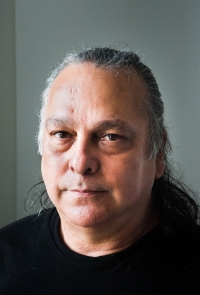I owe nothing to Cuba. I learned everything myself.

Download image
Sergio Lastres was born in Cuba on March 27, 1965, into a poor peasant family who never sympathized with the regime or even recognized it. When he grew up, he knew he couldn’t stay in Cuba because he imagined his life differently. Sergio liked art very much, and while he was accepted into an art school in Cuba, he never attended courses. After trying to escape from Cuba, he was fired from his job. This only encouraged him to try again. On the third attempt, he was successful. After several months in Guantanamo, Sergio and his wife arrived in the United States. Although they still have one grandchild daughter in Cuba, they never want to go back. Freedom offers many opportunities, and they do not intend to give it up. In addition, Sergio is fully devoted to his beloved art. During his life, he understood that discussing communism with people was not easy. And the attitude of some Cubans to the struggle for freedom totally discouraged him from trying and risking his own life. Sergio believes that much of Cuban society is not interested in any significant change.
